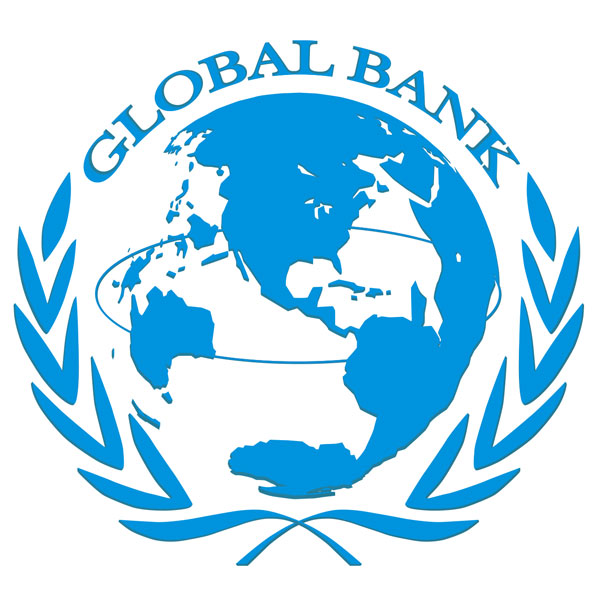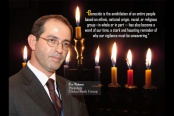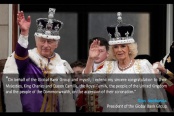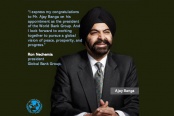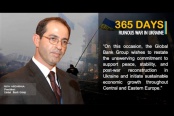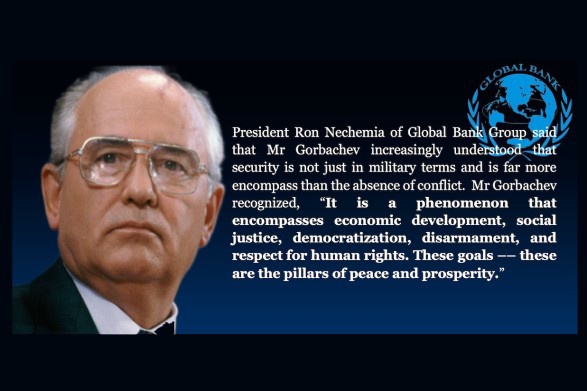
Newport Beach, CA – August 31, 2022 — President Ron Nechemia issued today the following statement on the passing of Mikhail Gorbachev.
On behalf of the Global Bank Group, I extend my heartfelt condolences to Mikhail Gorbachev’s family and the people and government of the Russian Federation.
Global Bank pays tribute to Gorbachev’s ‘commitment to peace.’
Global Bank joins people around the world in mourning the passing of the last Soviet Union leader, Mikhail Gorbachev, who was a significant driver of change in the 20th century.
Mr Gorbachev worked to reduce nuclear arsenals and relieved people worldwide from praying for an end to the nuclear arms race. On February 28, 1987, in a surprising announcement, the Union of Soviet Socialist Republics (USSR) leader Mr Mikhail Gorbachev indicated that his nation was ready to sign “without delay” a treaty designed to eliminate U.S. and Soviet medium-range nuclear missiles from Europe. Mr Gorbachev’s offer led to a breakthrough in negotiations and, eventually, to the signing of the Intermediate-Range Nuclear Forces (INF) Treaty in December 1987.
I was deeply saddened to learn of the passing of Mikhail Gorbachev, a statesman who changed the course of history. Mr Gorbachev did more than any other individual to bring about the peaceful end of the Cold War without bloodshed.
President Ron Nechemia of the Global Bank Group said that Mr Gorbachev increasingly understood that security is not just in military terms and is far more encompass than the absence of conflict. Mr Gorbachev recognized, “It is a phenomenon that encompasses economic development, social justice, democratization, disarmament, and respect for human rights. These goals –– these are the pillars of peace and prosperity.”
In the early part of the year 1990, unexpectedly, I received an official invitation from Mr Gorbachev to visit the Soviet Union for a meeting, which I acted upon in October 1990. He and I spoke at length about the ongoing work to draw foreign capital to help refurbish the Soviet’s decrepit infrastructure and explored ways to increase trade and investment.
My most profound impressions of him are formed during the times when we were facing politically and diplomatically challenging situations. He was always careful to listen and willing to compromise. He was committed to deepening relationships and cooperation. It was easy to see why so many people worldwide held him in such high regard.
About Mikhail Gorbachev
Mikhail Gorbachev, the first and only president of the Soviet Union, who ended the Cold War without bloodshed but failed to prevent the collapse of the Soviet Union, died on Tuesday at the age of 91 after a long illness, Moscow’s Central Clinical Hospital said in a statement.
Mr Gorbachev forged nuclear arms reduction deals with the United States and partnerships with Western powers to remove the Iron Curtain that had divided Europe since World War Two and bring about the reunification of Germany.
Gorbachev ushered in sweeping changes like “perestroika” (“restructuring” in Russian) and “glasnost” (“openness”), reforms that sought to restructure the Russian economy and make its government more transparent.
Receiving the 1990 Nobel Peace Prize, Mr Gorbachev observed that “peace is not unity in similarity but unity in diversity.” He put this vital insight into practice by pursuing the path of negotiation, reform, transparency and disarmament.
On December 25, 1991, after six years and nine months at the helm, Mr Gorbachev resigned as the president of the Soviet Union. Following his reignition, on the next day, the Soviet Union dissolves.
The Nobel Peace Prize laureate has seen Mr Gorbachev as one of the most influential leaders of the 20th century.
In his later years, Mikhail Gorbachev embraced a new challenge just as vital for the well-being of humankind: creating a sustainable future by cultivating harmonious relationships between humans and the environment. It was in this spirit that he founded Green Cross International.


